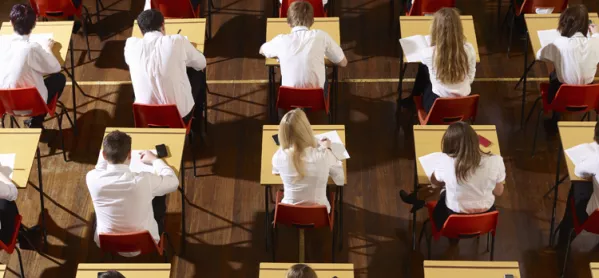- Home
- ‘The “easy” IGCSE argument is really about much bigger issues’
‘The “easy” IGCSE argument is really about much bigger issues’

With Parliament in recess over the Christmas period, Labour MP Lucy Powell used the respite from the Brexit chaos to intensify the ongoing controversy surrounding the use of International GCSE exams (IGCSEs) in private schools.
Data released in response to Powell’s parliamentary question has shown that 91 per cent of those who take the supposedly “easier” IGCSEs are privately educated, whereas the government’s allegedly more “rigorous” GCSEs, introduced under the premiership of Michael Gove, are now obligatory for students in the state sector.
Labour is, therefore, arguing that the “easier” IGCSE exams are giving privately educated students an additional unfair advantage, particularly when it comes to university admissions. This is also following a Tes report last year that revealed that universities were asking for lower grade requirements for the IGCSEs than the GCSEs taken in state schools.
On the one hand, Powell’s intervention is to be commended. Labour is absolutely right to highlight the ongoing disparity between the private and state sector when it comes to university admissions. Let’s not forget that a private school applicant is still 55 times more likely to win a place at Oxbridge than a state school student on free school meals.
Arguably, the grossly unequal distribution of resources between the private and state sector has as much to do with this disparity as the choice of examination used in schools. But it’s important that Labour are highlighting how our education system currently has one rule for private schools and another for everyone else.
What is a 'rigorous' GCSE?
Why should private schools have the autonomy to reject the Conservatives' basket case GCSE reforms and choose assessment materials that best suit their students, whilst teachers like me, who work in state schools, do not have the luxury of that choice?
But, on the other hand, there are significant drawbacks to Powell’s line of attack. The IGCSE controversy is as much about curriculum and assessment as it is about private school inequality. By continuing to use the Conservative rhetoric of "rigorous" and "easy" GCSE exams, Labour are failing to expose the ideological values that underpin this debate.
For the political right, “rigorous” now means canonical, often elite knowledge, examined by high-stakes, summative assessments. “Easy” is caricatured as any knowledge that could be described as "engaging" or even "subversive", assessed by modular exams, coursework and sometimes oral components.
Many will recognise this as a proxy war for the “traditional versus progressive” feud that rages seemingly unabated in parts of the education community. This debate is important, yet is often characterised by a discussion of what and how we teach, but not why.
By uncritically describing "rigorous" and "easy" GCSE exams, we do not get to the root of the ideological conflict about the purpose of education that is at the heart of the ongoing conflict over curriculum and assessment.
Shadow education secretary Angela Rayner’s promise, therefore, of a “full, root-and-branch review” of the Conservatives' reforms to qualifications following the latest IGCSE debacle should be welcomed.
If this is going to be meaningful, however, it must engage with this question of purpose. The review will need to challenge not just the arduous, absurdly dense nature of the current GCSEs, but the social mobility myth that continues to justify its implementation.
For the "rigour" advocates, the current GCSE assessments make total sense. For them, the purpose of education is to give a select few "hard-working" or "gifted" students an escape route out of poverty through a diet of regurgitated canonical knowledge, in order that working-class students can compete with their more wealthy peers.
There are some that even argue that we can have social mobility for all. But this is a fantasy; there simply aren’t enough top jobs or places at Russell Group universities to go around.
Labour, therefore, needs to be proposing something far more ambitious. The young people we teach need to be equipped with the knowledge and skills to tackle some of the greatest collective challenges we face in the 21st century, including rising inequality, devastating climate change and the threat of automation.
We also need to prepare young people to address the problems they see in their own communities, whether that’s the growing housing crisis, an ageing population or the mental health epidemic that blights so many of our young people and their families.
How we design the curriculum and assessment to meet those demands will certainly be no easy task. The Labour Party must work with teachers in their unions, as well as those in the broader education community, to boldly address these questions. This will include radically redefining what we mean by a “rigorous” education.
The Labour Party should be celebrated for grasping this opportunity to get education back on the political agenda – but it’s time to get radical when it comes to policy on curriculum and assessment. Our schools, teachers and students need nothing less.
Holly Rigby is a teacher, and researches the National Education Service at King’s College London
Register with Tes and you can read two free articles every month plus you'll have access to our range of award-winning newsletters.
Keep reading with our special offer!
You’ve reached your limit of free articles this month.
- Unlimited access to all Tes magazine content
- Save your favourite articles and gift them to your colleagues
- Exclusive subscriber-only stories
- Over 200,000 archived articles
- Unlimited access to all Tes magazine content
- Save your favourite articles and gift them to your colleagues
- Exclusive subscriber-only stories
- Over 200,000 archived articles


